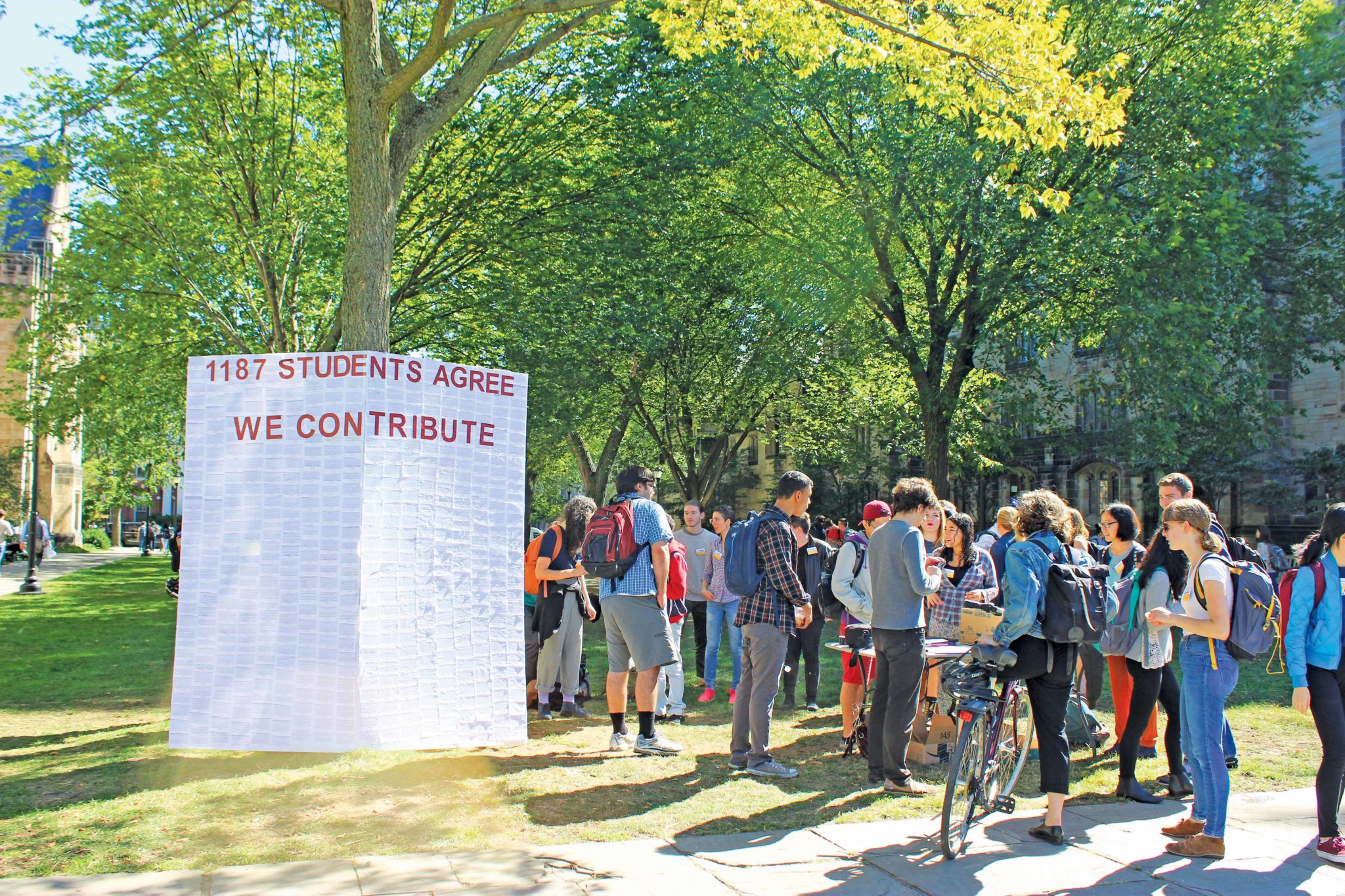
Over the next year, Yale plans to formulate marketable goals for its next major fundraising push. But even with a potentially multibillion dollar budget, the University is unlikely to make eliminating the student effort portion of financial aid a priority of its upcoming capital campaign.
Since 2012, the activist group Students Unite Now has advocated for the full elimination of the student effort, which totals $5,950 for most students. But in an interview with the News, University President Peter Salovey said the University would not consider the elimination of the student effort in its next campaign.
“We would have goals around supporting student financial aid, but we would never articulate a goal that would be around such a specific area of financial aid policy,” Salovey told the News last fall. “I think you want to state the fundraising goal in a way that motivates the greatest number of people to give, and I think you want flexibility in the implementation of campus policy.”
Vice President for Development Joan O’Neill said donors would “probably not” be interested in helping fund the elimination of the student income contribution. Asked whether the University would accept a donation toward the elimination of the student effort, she said that strategic changes to Yale’s financial aid policy — like eliminating the student effort — would be institutional decisions.
“We tend to talk about financial aid as ‘the financial aid,’ not a subset of ‘the financial aid.’ We don’t break it down,” O’Neill said. “We talk about making it possible for students to come to Yale from all backgrounds, and people know that Yale is coming up with what the formula is. … The University makes a strategic decision. It’s not the gift that drives how we’re going make decisions.”
Last week, in a follow-up interview about financial aid, Salovey said there are “more appropriate” and “effective” ways to channel funds than to eliminate the student effort, such as the new Start-Up Fund that helps first years pay for expenses such as a computer or winter clothing. Earlier this month, Yale College Dean Marvin Chun introduced the Y-Work Award for outstanding undergraduate student employees. Some students hold on-campus jobs to cover the student effort portion of financial aid, and the award, presented to a handful of undergraduates working on-campus jobs, will offer students an undetermined amount.
Salovey maintained that working teaches students how to manage money, how to navigate the tax system and how to interact with people “from all walks of life.” He added that student employment can also teach self-reliance and build confidence, recalling that his time as an electrician’s apprentice during college was a “valuable part” of his educational experience.
In an ideal world, Salovey added, he would want all Yale students to have work-study experience. But, he noted, no one is forced to work since students can take out loans.
Student activists have long argued that the student effort requirement disproportionately burdens low-income students and creates two different Yale experiences. SUN has repeatedly sought to meet with top Yale administrators to discuss financial aid policy. In 2016, the group met with Director of Financial Aid Caesar Storlazzi. When the group asked to meet with Salovey last spring, he said he was reluctant to sit down with SUN and criticized the group’s tactics as confrontational. But Salovey, Dean of Undergraduate Admissions and Financial Aid Jeremiah Quinlan, and former Dean of Yale College Jonathan Holloway met with two leaders of SUN last May. Chun told the News last week that he had reached out to meet with members of SUN.
“I find it frustrating that President Salovey believes that only students like me, who are on financial aid, need to be taught the value of work,” SUN leader David Diaz ’18 said. “I know the value of work. I know it because my family sacrifices. … For me, the student income contribution means that I have to contend with the guilt of knowing that my family is paying more than even Yale expects it to. I hope President Salovey will listen to what low-income students and students of color like me have been saying and create a more equitable experience of Yale by eliminating the student income contribution.”
Still, financial aid more generally is set to be a priority for the next capital campaign, according to Vice President for Global Strategy Pericles Lewis. A committee chaired by Lewis is recommending that Salovey and Provost Benjamin Polak increase financial aid for international graduate and professional school students.
Hailey Fuchs | hailey.fuchs@yale.edu
Correction, Feb. 22: An earlier version of this story reported that Salovey told the News last spring that he was reluctant to sit down with SUN. In fact, the month after the interview, Salovey, along with Dean of Undergraduate Admissions and Financial Aid Jeremiah Quinlan and the former Dean of Yale College Jonathan Holloway, met with two leaders of SUN.







